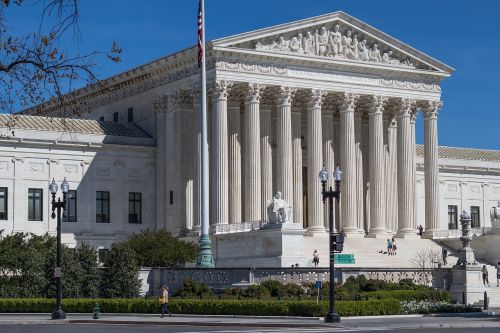Organization Trends
Supreme Court Rules Against Forced Donor Disclosure—and Intimidating “Cancel Culture”
Briefly looking back to before AFPF v. Bonta and forward to the future.
 U.S. Supreme Court building. Credit: MarkThomas. License: Public domain/Needpix.com.
U.S. Supreme Court building. Credit: MarkThomas. License: Public domain/Needpix.com.

In February 2020, Capital Research Center (CRC) president Scott Walter testified in favor of a proposed regulation that would end the Internal Revenue Service practice of requiring all 501(c) groups, except 501(c)(3)s, to disclose to the government their largest donors’ names, addresses, and combined contributions.
We could “be confident that some state government officials hope to use the forced donor disclosure,” according to Walter,
to expose donors to intimidation. The threat of intimidation against free speech is so great in our day that we have invented a new term, “cancel culture,” to recognize the threat. It was especially disingenuous for the State of California to pretend in a lawsuit over its efforts to coerce disclosure that there is no such threat. You’ll recall that the founder and CEO of a giant tech firm had to resign because of a small donation to a California ballot initiative that he had had exposed.
The then-pending California lawsuit was brought by two tax-exempt, nonprofit organizations against the state for its treatment of them. The public-charity plaintiffs claimed that California’s aggressive compelled-disclosure requirement unconstitutionally infringed on their First Amendment rights and those of their donors. Over the course of the long litigation, defendants in the case included then-California Attorney Generals Kamala Harris and Xavier Becerra.
The tech firm CEO who had to resign because of his disclosed donation was Mozilla’s Brendan Eich, who financially supported Proposition 8—which banned same-sex marriage. The proposition passed, but was later overturned in court. Eich was a relatively early victim of the “cancel culture” Walter described.
The California suit is no longer pending, and neither Harris nor Becerra are California’s attorney general anymore, either.
No Longer, but Still
Earlier this month, the U.S. Supreme Court’s momentous ruling in Americans for Prosperity Foundation (AFPF) v. Bonta held, 6-3, that the California’s forced disclosure of donors to nonprofits is unconstitutional. The proposed change in IRS regulations about which Walter testified would thus be unnecessary.
In his opinion for the Court, Chief Justice John Roberts cited NAACP v. Alabama, in which nonprofit donors plausibly felt intimidated by what could result from disclosure of their personal information.
“[T]he Attorney General’s disclosure requirement imposes a widespread burden on donors’ associational rights,” Roberts’ AFPF v. Bonta opinion concludes. “And this burden cannot be justified on the ground that the regime is narrowly tailored to investigating charitable wrongdoing, or that the State’s interest in administrative convenience is sufficiently important.”
As for Harris, she’s now vice president of the United States, of course, and Becerra is the secretary of the U.S. Department of Health and Human Services. Former Mozilla CEO Eich, though, remains former Mozilla CEO Eich—cancelled. He is the CEO of another, presumably less “woke” software company.
Cancel Culture’s Future
More generally, and concerningly, cancel culture has other contexts in which to assert itself, and it will do so. For its opponents like CRC and others—who will continue to try combatting its ill effects in many of these different contexts, too—AFPF v. Bonta bodes quite well.


